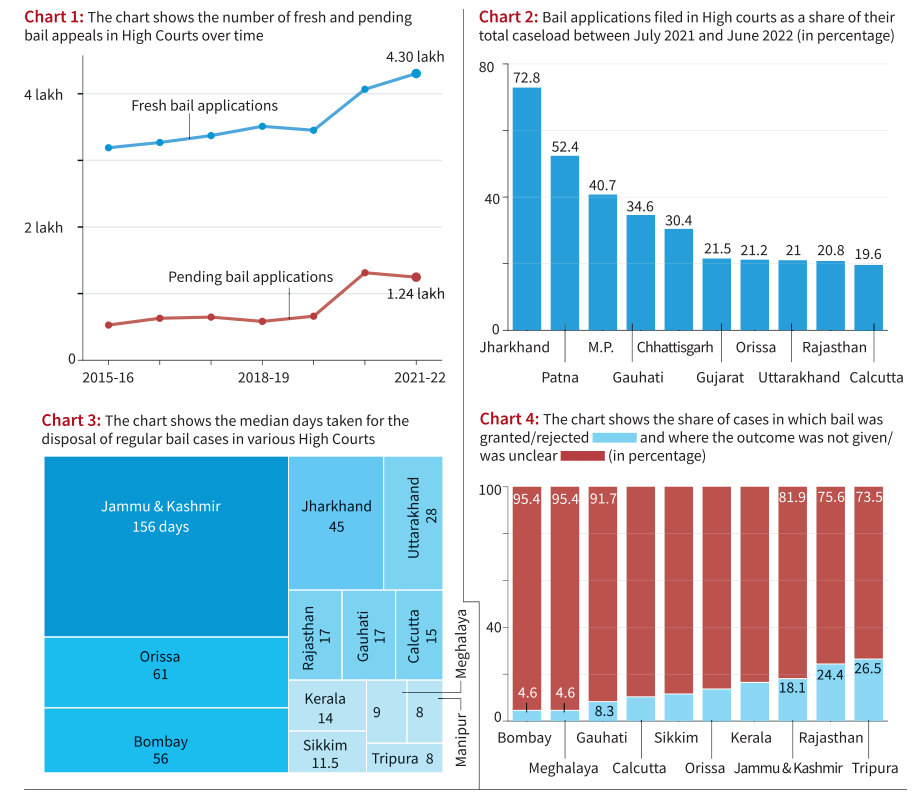Indian Polity
Surge in Bail Appeals in Indian High Courts
- 16 Aug 2023
- 7 min read
For Prelims: Surge in Bail Appeals in Indian High Courts, High Court dashboard, DAKSH, Epidemic Diseases Act, 1897, Code Of Criminal Procedure (CrPC), 1973.
For Mains: Surge in Bail Appeals in Indian High Courts, Bail Appeals.
Why in News?
The number of Bail Appeals filed in India’s High Courts surged post 2020, according to the ‘High Court dashboard’ by DAKSH, a think-tank focussed on law and justice system reforms.
- DAKSH analyzed 9,27,896 bail cases filed between 2010 and 2021 across 15 High Courts. These courts followed distinct naming patterns for bail cases. The data revealed 81 case types associated with bail across the analyzed High Courts.
What are the Statistics Related to Bail Appeals?
- Bail Appeals are on Rise:
- Bail appeals have risen from approximately 3.2 lakh to 3.5 lakh annually before 2020, to 4 lakh to 4.3 lakh thereafter from July 2021 to June 2022.
- Consequently, the number of pending bail appeals in High Courts has surged from around 50,000 to 65,000 to between 1.25 lakh to 1.3 lakh.
- High Courts and Caseload Distribution:
- The distribution of caseloads varied across different High Courts. In some states, such as Patna, Jharkhand, Odisha, Madhya Pradesh, and Chhattisgarh, bail appeals formed more than 30% of the total caseload between July 2021 and June 2022.
- Disposal Time and Outcome Uncertainty:
- The median time taken for disposal of regular bail applications varied among High Courts. Some High Courts had significantly higher disposal times, raising concerns about delays in the resolution process.
- Delays in deciding on bail cases are seen as equivalent to denying bail, as the accused remains incarcerated during this period.
- Incomplete Outcome Data:
- The data also highlighted the lack of clarity regarding the outcomes of bail appeals in High Courts. In nearly 80% of disposed bail cases in all High Courts, the outcome of the appeal, whether it was granted or rejected, was unclear or missing.
What are the Reasons for Surge in Bail Appeals?
- Covid Violations and Disruption in Court Functioning:
- There has been an increased number of cases related to violations of Covid-19 lockdown norms during the pandemic.
- Additionally, the disruption of court functioning during this period could have contributed to the accumulation of pending bail cases.
- However, the exact cause cannot be definitively determined from court data.
- Epidemic Diseases Act as a Factor:
- The Epidemic Diseases Act, 1897 may have played a role in the increase in bail appeals. While 77% of regular bail cases did not mention the specific Act under which the appellant was imprisoned, analysis of the remaining 23% showed the Epidemic Diseases Act ranked fourth.
- This hints at a potential surge in cases under this Act contributing to the increase in bail appeals.
What is Bail and What are its Types?
- Definition:
- Bail is the conditional/provisional release of a person held under legal custody (in matters which are yet to be pronounced by the Court), by undertaking a promise to appear in the Court as and when required.
- It signifies a security/collateral deposited before the Court for release.
- In Supt. and Remembrancer of Legal Affairs v. Amiya Kumar Roy Choudhry (1973) case, the Calcutta High Court explained the principle behind giving Bail.
- Types of Bail in India:
- Regular Bail: It is a direction given by the Court (any Court within the country) to release a person who is already under arrest and kept in police custody. For such Bail, a person can file an application under Section 437 and 439 of the Code Of Criminal Procedure (CrPC), 1973.
- Interim Bail: Bail granted for a temporary and short period by the Court till the application seeking Anticipatory Bail or Regular Bail is pending before a Court.
- Anticipatory Bail or Pre-arrest Bail: It is a legal provision that allows an accused person to apply for bail before being arrested. In India, pre-arrest bail is granted under section 438 of the CrPc, 1973. It is issued only by the Sessions Court and High Court.
- The provision of pre-arrest bail is discretionary, and the court may grant bail after considering the nature and gravity of the offence, the antecedents of the accused, and other relevant factors.
- The court may also impose certain conditions while granting bail, such as surrendering the passport, refraining from leaving the country, or reporting to the police station regularly.
- Statutory Bail: The remedy of statutory bail, also known as default bail, is distinct from bail obtained in the ordinary procedure under CrPC Sections 437, 438, and 439. As the name implies, statutory bail is given when the police or investigating agency fails to file its report/complaint within a certain time frame.
Note: Article 21 of the Indian Constitution gives everyone the right to life and personal liberty. It provides the fundamental right to live with human dignity and personal freedom, which entitles us to seek bail when detained by any law enforcement entity.







